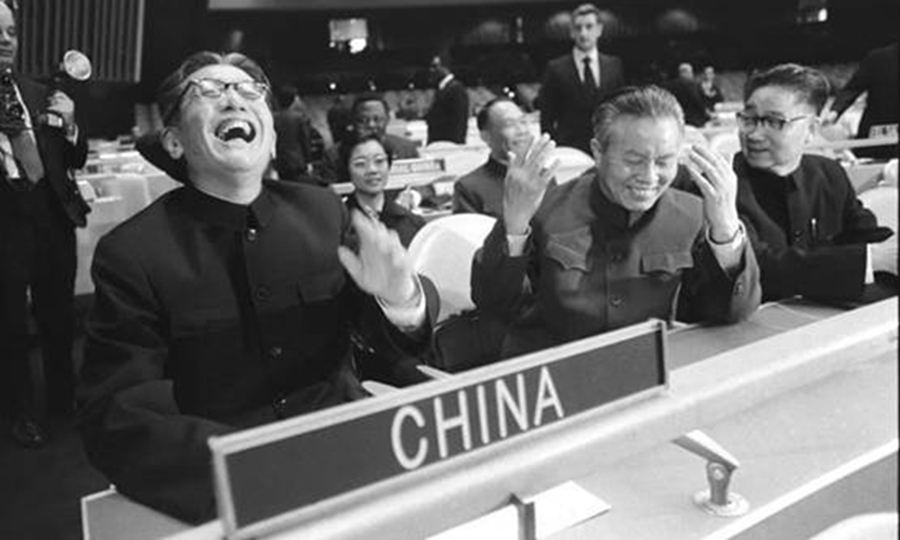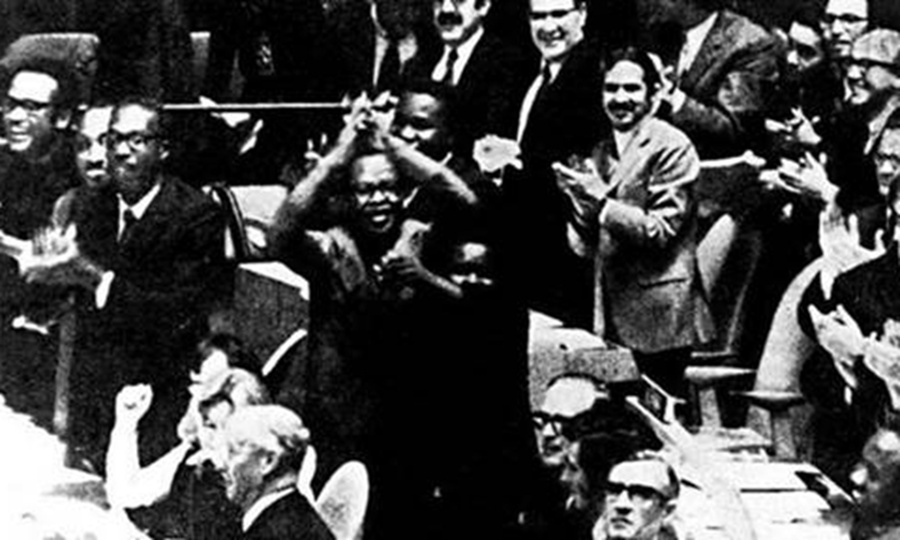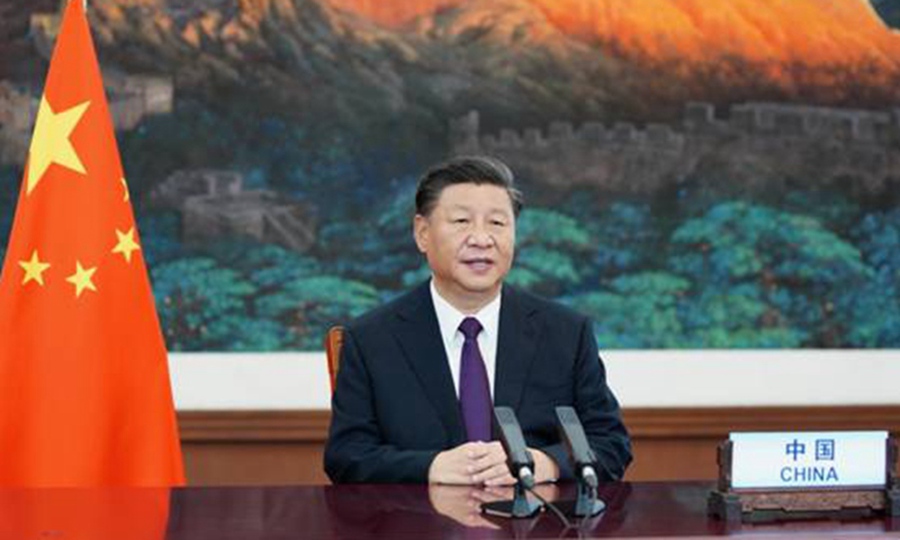




- BRNN
- BRI News
- BRNN News
- Database
Official Documents Polices and Regulations
Inter-government Documents International Cooperation BRI Countries
Business Guide Economic Data BRI Data
Trade
Investment Projects Latest projects
Cases - Content Pool

On November 15, 1971, headed by then Vice Foreign Minister Qiao Guanhua, the delegation of the People's Republic of China (PRC) made its debut at the United Nations (UN) Assembly Hall. The delegation immediately became the focus of attention at the 26th Session of the UN General Assembly (UNGA). When asked about how he felt, Qiao leaned back and replied with a loud laugh that impressed everyone present. Qiao said later that his expression had already answered the question. That was the moment when a classic photo of Qiao's Laugh was taken.
Behind this confident laugh though was a long struggle. Since the PRC was founded, the Central People's Government has been the only legitimate government representing all the Chinese people. It naturally deserves the seat of China at the UN. Due to the manipulations of the US, however, China's representation had long been kept off the UN agenda.
With China's rising international profile and the increasingly important roles of Asian, African and Latin American and Caribbean countries at the UN, the issue of China's representation was submitted to the 16th Session of UNGA held in 1961 for deliberation, breaking through the obstacles set by the US. Subsequently, the US proposed that the issue be discussed as an Important Question (IQ) that required a two-thirds majority to pass, attempting to distort the nature of China's representation.
Despite what the US did, the overall momentum was in China's favor. More and more members of the international community supported the PRC in restoring its lawful seat at the UN. At the 25th Session of UNGA in 1970, when the number of votes for restoring China's lawful rights and expelling the KMT representatives for the first time exceeded votes of opposition (specifically, 51 votes in favor, 47 votes against), applause swept the Assembly Hall.
Reluctant to accept the result, the US cooked up a resolution on "dual representation." Its chief representative to the UN said the US was deeply worried by the fact that both Taipei and Beijing claimed they were the only government of China. The US held that this fact must be considered when deliberating over China's representation and the UN should not be asked to choose between Taipei and Beijing.
On September 21, 1971, the 26th Session of UNGA opened in New York. At the session, three draft resolutions on China's representation were submitted. Heated debates among member states lasted for a week from October 18 to 25. The US and some other Western countries lobbied around wielding the carrot and the stick, attempting to draw the Third World countries into their orbit.
The IQ resolution (any proposal depriving the "representation" of the "Republic of China" at the UN was an Important Question) was rejected with 59 votes against, 55 votes for and 15 abstentions. That was an exciting result for the Assembly. The Tanzanian representative even left his seat and danced to celebrate.

The Dancing Tanzanian Representative Salim Ahmed Salim
Before the draft resolution backed by Albania and Algeria was put to vote, the US representative George H.W. Bush made one last try. He suggested deleting the sentence about expelling forthwith the representatives of Chiang Kai-shek. The attempt failed after setting off a storm of opposition. The draft resolution, known as Resolution 2758, was passed with an overwhelming majority of votes (76 votes for, 35 votes against and 17 abstentions). The "dual representation" draft resolution submitted by the US, Japan and other countries (accepting the representatives of the PRC while retaining the representation of the "ROC") immediately became null and void.
The Chinese people finally restored their seat at the UN, which truly made the UN the biggest international organization in the world .
George H.W. Bush admitted later that it was a turning point in the history of the UN and the anti-Western group for the first time defeated the US when the country's prestige was shaken.
The whole Chinese nation was thrilled to hear the news. As for whether China should attend the 26th Session of the UNGA, Mao Zedong gave a definite answer: a delegation must soon be formed. Mao said that it was the African brothers who carried us into the UN, and we should stand with them. China would be there not to complain, but to promote justice for people of the world, boost their confidence, and voice support for countries fighting foreign interference, aggression and control.
Qiao Guanhua, after being appointed head of the delegation, shut himself up in the room for a couple of days to write the first address at the General Assembly. The address was warmly received by many countries at the General Assembly and Qiao's Laugh became an icon for China's diplomatic confidence. Adam Malik, President of the 26th Session of UNGA, welcomed the Chinese delegation, saying it would contribute to the work of the UN.

President Xi Jinping addressing the High-level Meeting to Commemorate the 75th Anniversary of the UN via video link in 2020
China today plays a critical role at the UN. On September 21, 2020, President Xi Jinping attended the High-level Meeting to Commemorate the 75th Anniversary of the UN. In his remarks, President Xi shared four proposals for the UN to better play its role in the post-COVID era: stand firm for justice, uphold the rule of law, promote cooperation and focus on real action. President Xi underlined that China will continue to be a true follower of multilateralism, firmly uphold the UN-centered international system, firmly uphold the international order underpinned by international law, and firmly defend the UN's central role in international affairs. The original aspiration and the mission of Chinese Communists is to seek happiness for the Chinese people, rejuvenation for the Chinese nation, and the common good for the world. China has been contributing more Chinese wisdom and proposals to global governance.
The year 2021 marks the 50th anniversary of the restoration of China's lawful seat at the UN. From China's return after relentless efforts to presenting China's ideas at the UN, the photo of Qiao's Laugh has never faded. Rather, it has borne new significance. Time flies, and we have now embarked on the new journey of major-country diplomacy with Chinese characteristics.

Tel:86-10-65368972, 86-10-65369967